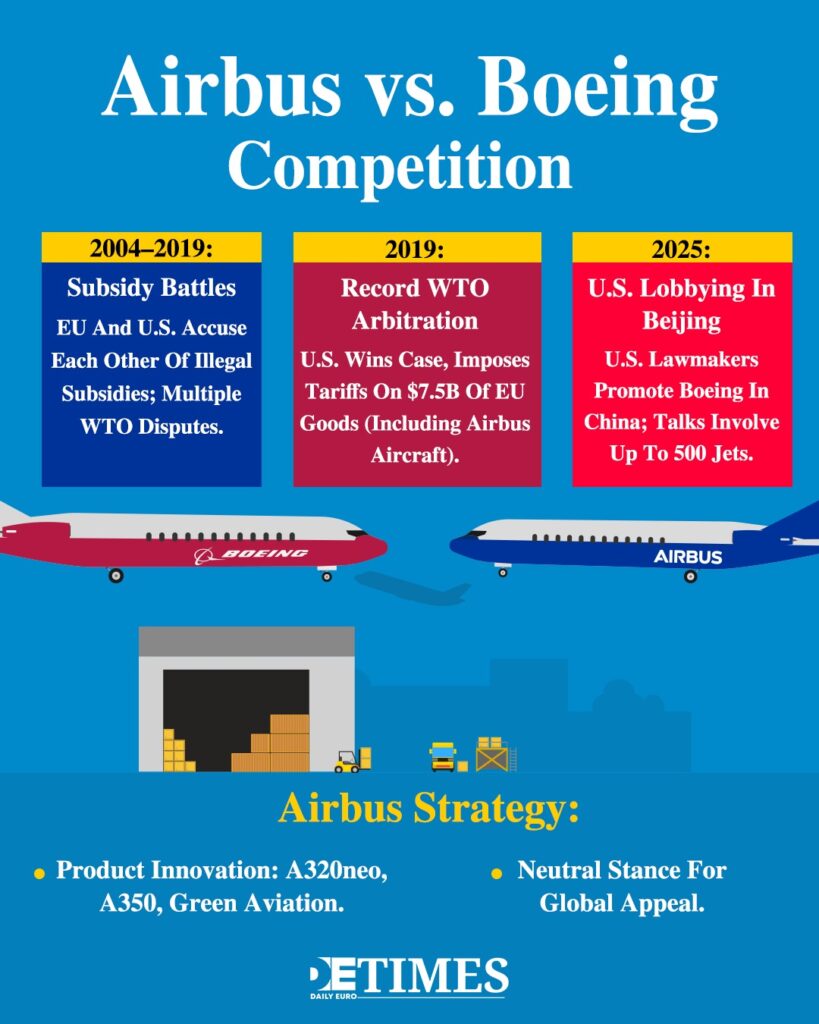In recent years, American aircraft manufacturer Boeing has benefited significantly from the active diplomatic support of former U.S. President Donald Trump. He personally announced billion-dollar deals with airlines in Türkiye, Uzbekistan, and Qatar, and actively lobbied for Boeing sales in other countries.
While Boeing receives political support, Airbus, its European competitor, lacks such a powerful lobbyist. Despite this, Airbus is in no need for government support as independence proves the winning factor.
No Need for Trump’s Support?
Airbus currently has over 8,700 orders in its backlog, while Boeing has over 2,000 less orders at 6,500.
The A320 and A350 models have virtually no available delivery slots until 2030. Airbus is leading on the order book whilst Boeing is falling behind on orders and delivery.
According to data from Forecast International, Boeing is delivering a mean average of 346 less models per annum (2021-2024) on 2015-2018 figures owing to a production-delivery disconnect.

Risks of Political Support
While support from high-profile politicians can be beneficial, it can also lead to risks.
For example, excessive politicisation of deals can provoke resentment from other countries and lead to trade disputes. Airbus prefers to avoid such situations to maintain its reputation as a neutral and reliable partner.
Political support can also lead to the imposition of retaliatory duties, as demonstrated in previous WTO decisions that targeted Airbus and Boeing.
Reliance on government lobbying can reduce a company’s incentives to innovate or improve operational efficiency. Finally, overt political interference can complicate negotiations with airlines, which prefer commercially sound decisions over those driven by political influence.
Airbus and Boeing Competition: From Subsidies to the Chinese Market
The competition between Airbus and Boeing is not only a struggle between two corporations but also a long-running trade conflict between the EU and the US. Since 2004, both sides have accused each other of illegal subsidies, leading to numerous WTO disputes.
In 2019, the U.S. won the largest arbitration case in WTO history, gaining the right to impose tariffs on EU goods, including Airbus aircraft.
However, political interference has also played a role. For example, in 2025, a delegation of U.S. lawmakers visited Beijing to discuss a possible deal for the sale of up to 500 Boeing aircraft, a move made possible by improved bilateral relations.
Boeing actively uses political channels to advance its interests, Airbus prefers to focus on product quality and innovation, avoiding political dependence.
Benefits of Independence
The absence of political support allows Airbus to maintain independence and flexibility in decision-making.
The company can focus on the quality of its products and meeting customer needs without being distracted by political manipulation. This also assists build trust with international partners and customers.
Independence, Not State Dependence
While support from high-profile politicians can be beneficial, Airbus demonstrates that success in the aviation industry depends on product quality, reliability, and the ability to adapt to changing market conditions.
Rather than seeking political support, Airbus prefers to rely on its strengths and maintain independence in decision-making.
Read the Latest Articles on DET!
Plucked Out of Thin Air? How Meteorologists Name Storms
Suez on Rails: China is Changing the Map
I Need My Labubu: Wang Ning’s Billion Dollar Toy





